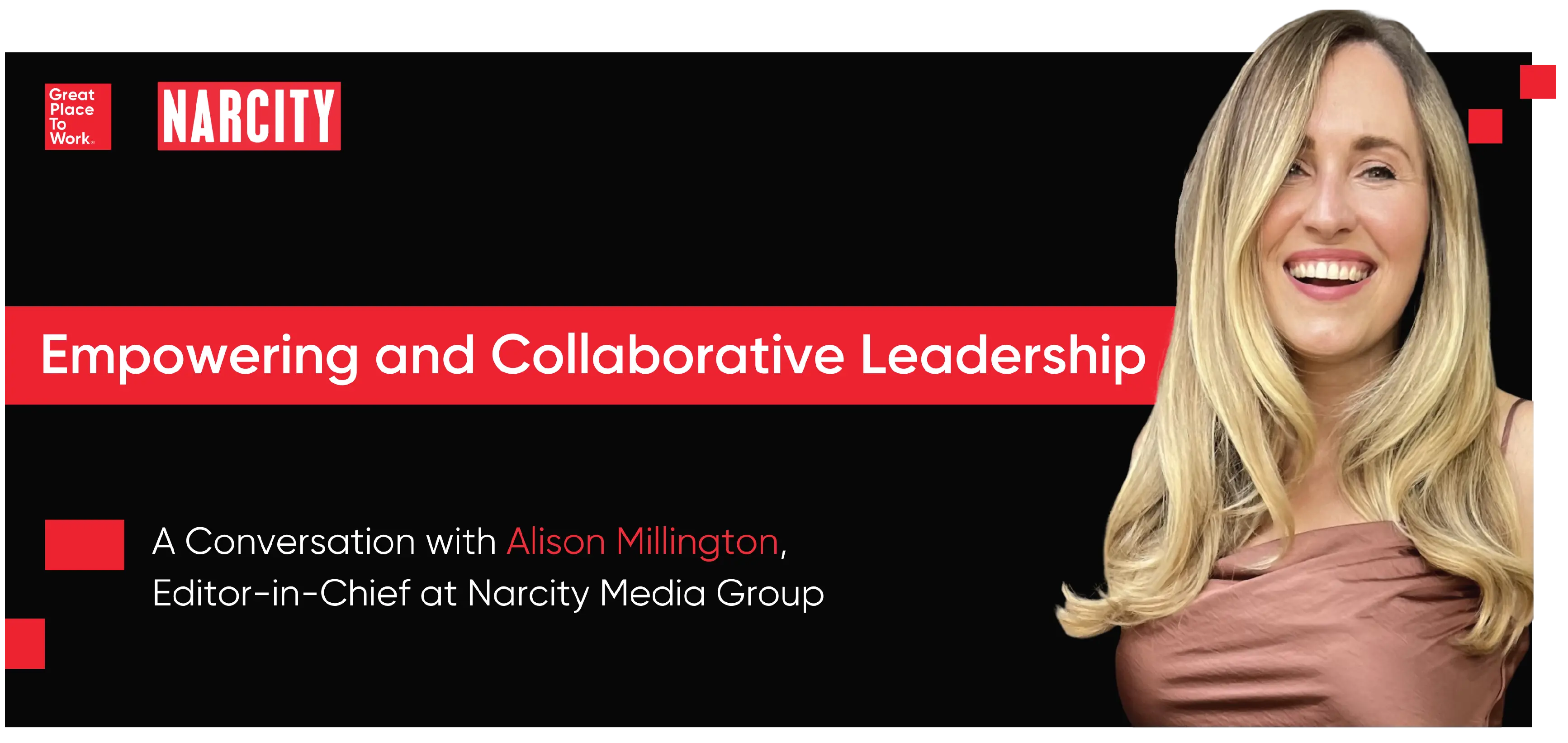
Alison Millington (she/her) is Editor-in-Chief at Narcity Media Group, overseeing the company's content divisions across Narcity & MTL Blog. She has a background in digital media as both a reporter and editor and has previously held roles as Managing Editor at blogTO based in Toronto, Canada and as Deputy Editor at Insider based in London, England.
At Great Place to Work® much of our time is spent analyzing data and speaking to leaders to better understand the impact they have on their teams and organizations. We know that human connection is key to effective leadership and culture. Today we are connecting with Narcity Editor-in-Chief Alison Millington to better understand her leadership style and the impact it has on the very fast paced environment of a growing media group, and how her personal approach to leadership enables that growth.
NANCY – Leadership styles may vary but great leaders understand the impact their style has not only on the business, but on the culture that evolves in the organization. How do you view your leadership style and the impact it has on your team?
ALISON
I try to model my leadership style after the managers and colleagues I’ve had and who have made an impact on me throughout my career. One of the biggest things for me is both showing and gaining trust — I’ve always thrived when working with leaders who empowered me to make decisions (and mistakes), and I believe it’s so important for people to know they have the freedom and confidence to experiment in order to do their best work. Kindness is also always key — coming from a place of empathy goes a long way in gaining the trust and respect of others at work.
NANCY - High-performing organizations make employee communications a priority. Oftentimes, employees tend to move in the direction that they think the people in charge want to go. How do you make your culture goals, objectives and priorities clear to everyone?
ALISON
We’re an incredibly transparent organization — more so than any organization I’ve ever worked for in the past. Whether it’s our CEO (Chuck Lapointe) or other managers throughout the business, we’re honest about our wins and our challenges, which I think makes a huge difference in people understanding why decisions are made. If I’m rolling out a new content strategy, I’ll present the context that led to it first so people feel more invested in the process.
Open and honest communication feels even more crucial in a remote and digital environment
NANCY - How has your approach to teamwork and corporate culture enabled Narcity’s rapid growth?
ALISON
It’s not just my approach — it’s the culture within our teams and the collaborative spirit both within the content department and across the business. We’re big on feedback in all directions, and there are a ton of opportunities for people to share ideas and concerns in different settings. This helps us bring the perspectives and skills of more talented people into as many conversations as possible.
NANCY - Your business necessarily needs you to be in-tune with culture across communities in order to thrive. Leaders know team culture is a key enabler of business strategy. How do you weave your mission and vision into your company culture and how do you stay in-tune with your team culture?
ALISON
The approachable, conversational, and friendly tone of our content often carries through to our internal communications. We also really embody the concept of the “global neighbourhood” as a business and team — we may be remote and virtual, but we’re still hyper-connected.
On a personal level, I think it’s crucial to make time for “work-free” conversations and get to know people above and beyond the day-to-day. I know how much others taking an interest in my life and wellbeing can have a positive impact on my outlook at work, so I make an effort to make personal connections with the people I work with as well.
Our wonderful People & Culture team also make this possible through social and work events planned to bring people together either in real life or in a remote setting through things like yoga or mindfulness sessions, French classes, Employee Resource Groups, happy hours, guest speakers and more.
NANCY - It’s repeatedly said that purpose is the backbone of a strong culture. It binds people working together, in all capacities, to realize rewards beyond financial performance. What are some of the ways that you make work meaningful for your employees?
ALISON
This can certainly be challenging in a fast-paced environment where change is a constant and pressure is high. We try to support people in finding time to work on “passion projects” aside from the day-to-day requirements of their role, which has resulted in a lot of cross-departmental collaboration where folks get involved in initiatives from other teams (for example, someone from our copy team trying their hand at reporting, or someone from our operations team supporting in script writing for video).
Another thing that I think we do well is talking early and often about growth opportunities within the business, so that everyone has the chance to learn about where they could go and what they should focus on to get there. We host training and workshops often to give people the tools to upskill, whether it’s directly related to their role or whether it’s shadowing someone from another department to see what other options could be available to them.
Again, our People & Culture team have done an amazing job at creating opportunities and tools that make it easy to recognize good work as well, and this is something that’s a huge part of our culture.
NANCY - Culture is reflected in both what people say and what people do. It’s shaped by how your employees talk about your company and the people connected to your company (e.g., customers, co-workers, managers, and leaders). Tell us what you do to strengthen your company culture?
ALISON
I think it’s so important for leaders of any kind to acknowledge their own mistakes and knowledge gaps, so I’m big on showing a willingness to learn from others and accountability for my own actions. If I don’t know the answer to something, or I need extra support, I’ll be honest about that — and I hope that makes people feel comfortable to also ask for help when they need it instead of suffering in silence. I try to be approachable and human — I’m pretty open about my own challenges.
Finally, feedback and recognition are key — we have so many people doing so many amazing things every day, so it can be hard to give everyone the praise they deserve, but I try to keep in mind that no matter how it’s expressed, people want to know that what they do matters, that someone notices, and that they’re appreciated.
About Great Place to Work®
Great Place to Work® is the Global Authority on Workplace Culture. We make it easy to survey your employees, uncover actionable insights and get recognized for your great company culture. Learn more about Great Place to Work Certification.








